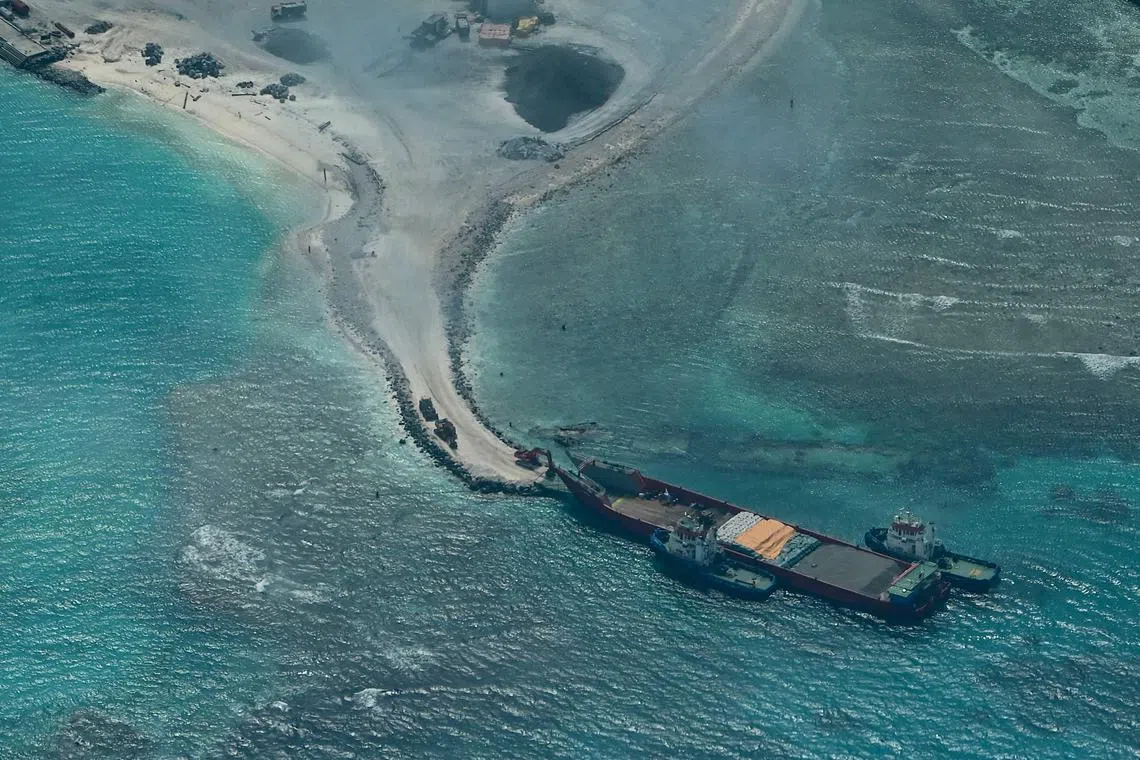Code of conduct on South China Sea must be actionable, Indonesia says after China-Asean talks
Sign up now: Get ST's newsletters delivered to your inbox

China and four Asean states – Brunei, Malaysia, the Philippines and Vietnam – have overlapping claims over the strategic waterway.
PHOTO: AFP
Follow topic:
JAKARTA - The code of conduct (COC) for the South China Sea, being drawn up by Asean and China, will have to be one that is effective and substantive, said Mr Sidharto R. Suryodipuro, director-general for Asean cooperation at Indonesia’s Foreign Ministry.
Speaking at a briefing on Friday after officials from Asean and China held meetings on the COC,
While he did not reveal specific details of the three-day discussions, Mr Sidharto stressed that the priority for the COC is to be “actionable”.
“We do not want the agreement to just simply be a document only, (where parties are) agreeing for the sake of agreeing. Thus, the COC has to be effective, substantive and actionable,” he said.
China and four Asean states – Brunei, Malaysia, the Philippines and Vietnam – have overlapping claims over the strategic waterway, an issue that has remained unresolved for decades.
China and Asean agreed in 2002 to work towards creating a code of conduct. Negotiations for the agreement have stalled because of various reasons, most recently due to the Covid-19 pandemic, which made it more difficult to hold in-person meetings.
As the rotating chair of Asean in 2023, Indonesia previously said it would hold new rounds of negotiations with member states and China.
Observers have said that as Asean chair in 2023 and the region’s largest economy, Indonesia hopes to use its influence to push for COC negotiations and explore new approaches to expedite a successful outcome.
The Straits Times understands that a number of working group meetings and official meetings at various levels to negotiate the COC are expected to take place in 2023. The talks that concluded on Friday were the first round of these negotiations.
The United States is also keeping a close watch on the upcoming agreement on the waterway. On Wednesday, US Assistant Secretary of State for East Asian and Pacific Affairs Daniel Kritenbrink told reporters in Jakarta that the US continues to stand for freedom of navigation, freedom of overflight and the peaceful resolution of disputes across the South China Sea.
“We think that the country’s claims in the South China Sea ought to be rooted in international law. And similarly... any disputes or overlapping claims should be resolved peacefully and in accordance with international law,” he said.
“In the light of that, we have continued to call for effective implementation from the Declaration of Conduct of the parties. And we have long supported the conclusion of a binding code of conduct that recognises the rights of all involved and that is fully consistent with international law.”
When asked about the US’ comments on the COC, Mr Sidharto said it is not yet clear what would be “legally binding” in such a document, and that this will need to be discussed among the various parties.
“If an agreement or a document is legally binding, what does that mean? Because of this, we need to be careful about the question of what is binding, as what is binding depends on the contents of the document, as well as the commitment of various parties to the document,” he said.
Mr Sidharto also stressed that the parties involved in the COC discussions were united in their aims to keep the waterway free of conflict, and to allow all nations to benefit from its potential opportunities.
“All sides have the same main focus, that is, that the South China Sea is a sea of peace and prosperity. So, we all gather around that interest,” he said.


